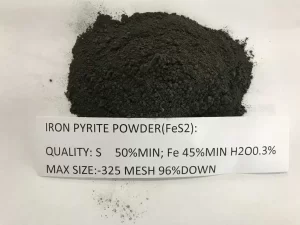In recent years, the agricultural sector has seen a growing interest in sustainable practices that enhance soil quality and crop productivity. One such natural mineral gaining attention is pyrite, commonly known as iron sulfide. While traditionally viewed as a waste product in mining, pyrite offers various benefits when applied as a soil conditioner. This article explores the application of pyrite in agriculture, highlighting its advantages and potential impact on soil health.
What is Pyrite?
Pyrite, often referred to as "fool's gold" due to its metallic luster and golden hue, is composed of iron and sulfur. It is commonly found in sedimentary rocks and can be abundant in mining regions. In its natural state, pyrite can contribute to soil fertility when managed appropriately, making it a valuable resource for farmers seeking to improve soil conditions.
Benefits of Using Pyrite in Agriculture
1. Soil Structure Improvement
One of the primary benefits of pyrite as a soil conditioner is its ability to enhance soil structure. When incorporated into the soil, pyrite can improve aeration and drainage, promoting better root growth and overall plant health. This is particularly beneficial in compacted soils where root penetration and water movement are restricted.
2. Nutrient Supply
Pyrite contains essential nutrients, including sulfur and iron, which are vital for plant growth. Sulfur plays a crucial role in protein synthesis and enzyme function, while iron is essential for chlorophyll production and overall plant vitality. By applying pyrite, farmers can supplement these nutrients, potentially reducing the need for synthetic fertilizers and promoting more sustainable agricultural practices.
3. pH Regulation
Soil pH significantly influences nutrient availability and microbial activity. Pyrite has the potential to help regulate soil pH, especially in alkaline soils. When pyrite oxidizes, it produces sulfuric acid, which can lower pH levels, making nutrients more accessible to plants. This characteristic can be particularly advantageous in regions where high soil pH limits crop production.
4. Enhanced Microbial Activity
Healthy soil is teeming with microbial life, which is crucial for nutrient cycling and organic matter decomposition. The presence of sulfur from pyrite can stimulate microbial activity, leading to improved soil health and fertility. A diverse and active microbial community enhances the breakdown of organic materials, releasing nutrients that plants can readily absorb.
5. Reduction of Soil Erosion
Improved soil structure and enhanced microbial activity contribute to increased soil cohesion, which can help reduce erosion. Erosion is a significant concern for agricultural lands, leading to loss of topsoil and diminished productivity. By incorporating pyrite into soil management practices, farmers can enhance soil stability and reduce the risk of erosion.
6. Environmental Benefits
The use of pyrite as a soil conditioner aligns with sustainable agricultural practices. By improving soil quality and nutrient availability, pyrite can reduce reliance on chemical fertilizers, thereby decreasing the environmental impact of farming. Additionally, natural pyrite powder make it a more eco-friendly option compared to synthetic alternatives.
Application Methods
To effectively utilize pyrite in agriculture, several application methods can be employed:
Direct Incorporation: Pyrite can be mixed directly into the soil during tillage. This method ensures that the pyrite is evenly distributed and can interact with soil microorganisms and nutrients.
Soil Amendments: Pyrite can be used as part of a broader soil amendment strategy, combining it with organic matter such as compost or manure to enhance its effects.
Top Dressing: In some cases, farmers may choose to apply pyrite as a top dressing to existing crops, allowing for the gradual release of nutrients and improving soil conditions over time.
Considerations for Use
While the benefits of pyrite are substantial, it is essential to consider specific factors before application:
Soil Testing: Conducting soil tests can help determine the current nutrient levels and pH, guiding appropriate pyrite application rates.
Monitoring: After application, monitoring soil health and crop performance is crucial to assess the effectiveness of pyrite as a conditioner.
Environmental Impact: Ensure that the use of pyrite aligns with local environmental regulations and practices to avoid unintended consequences.
If you are looking for iron pyrite powder suppliers, please click here.
Conclusion
The application of pyrite as a soil conditioner presents a promising avenue for improving soil quality and agricultural productivity. With its ability to enhance soil structure, supply essential nutrients, regulate pH, and promote microbial activity, pyrite can play a vital role in sustainable farming practices. By integrating pyrite into their soil management strategies, farmers can work towards healthier soils, increased crop yields, and a more sustainable agricultural future. As interest in environmentally friendly practices grows, pyrite stands out as a valuable resource in the quest for sustainable agriculture.
If you are looking for high-quality pyrite powder, please contact RunLong Industrial Co., Ltd. for detailed ordering information.

